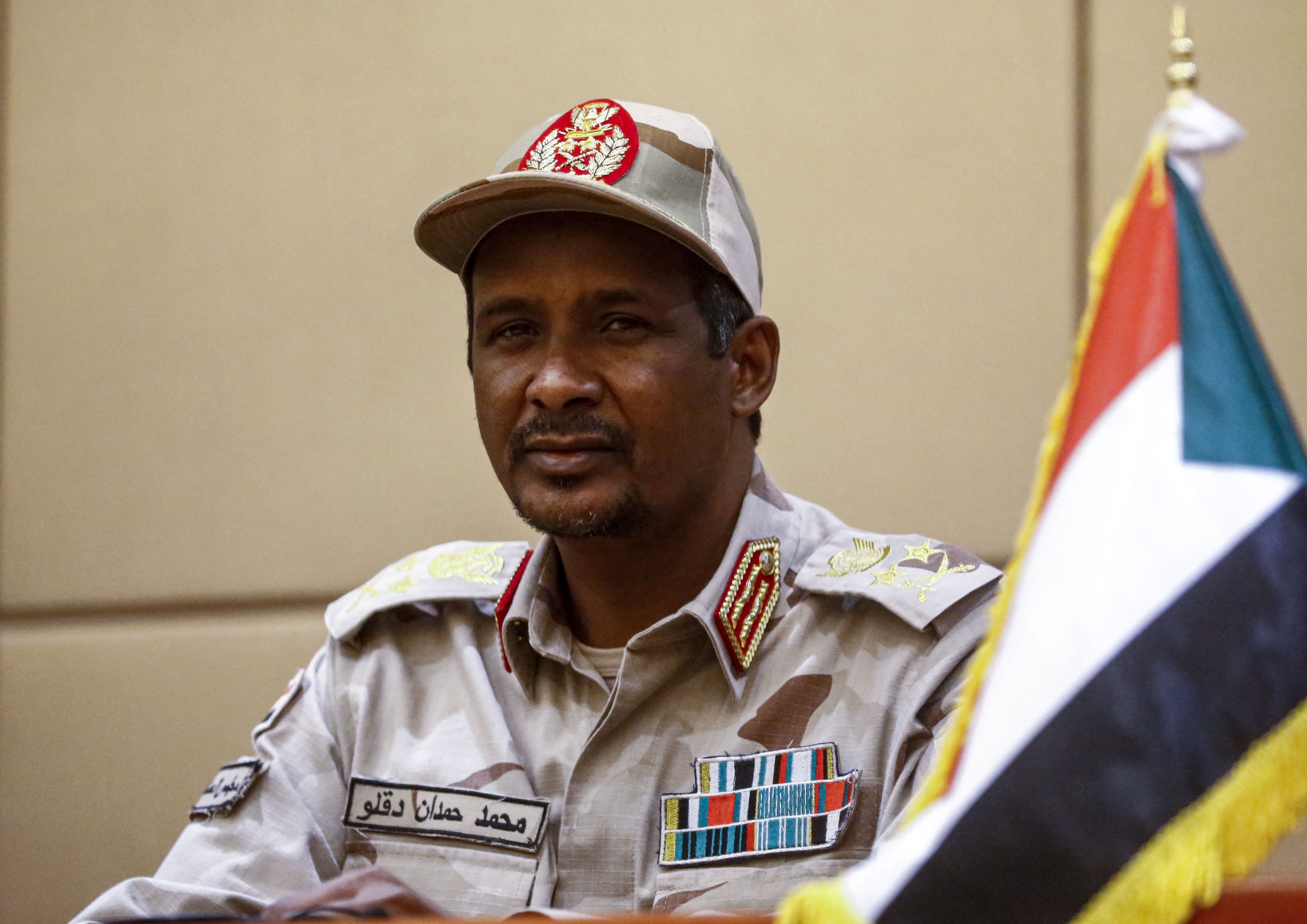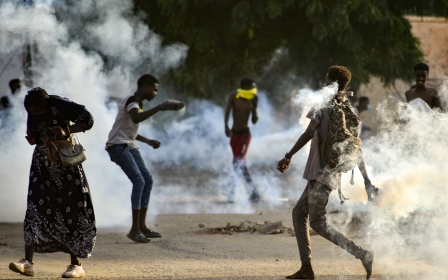Sudan coup: Where is Hemeti?

The military coup in Sudan, which began in the early hours of Monday morning with the arrest of Prime Minister Abdalla Hamdok, has had one man at its centre: General Abdel Fattah al-Burhan, head of the Sudanese Armed Forces (SAF) and chairman of what was Sudan's Transitional Sovereign Council.
Lurking in the background has been another military man, General Mohamed Hamdan Dagalo, widely known as Hemeti. Head of the paramilitary Rapid Support Forces (RSF), Hemeti's troops are out on the streets killing and injuring civilians, but the man himself has hardly been seen, leading to widespread talk about his whereabouts and his intentions.
It is now known that on Friday night he was meeting with Volker Perthes, the UN's special representative for Sudan, who tweeted that he urged Hemeti to "de-escalate, allow peaceful protest and avoid any confrontation tomorrow, 30 October".
Nevertheless, according to analysts, Hemeti appears to be biding his time, waiting to see how the coup plays out. He and Burhan are part of the same system, but if the general stumbles, Hemeti will look to take control of the putsch.
Widespread demonstrations planned across the country on Saturday could see the paramilitary leader emerge, and there are fears Hemeti's troops will inflict awful violence on the people of Sudan.
Tellingly, on Monday Hemeti's office was in touch with Ari Ben-Menashe, a former Israeli intelligence officer now working as a Canadian lobbyist.
In 2019, Hemeti signed a $6m lobbying contract with Ben-Menashe, who told the Africa Report that while that had since expired, Hemeti was now interested in discussing a new deal. "They are concerned about the new administration in the US, they want to understand where these guys [stand]," Ben-Menashe said. "And their real issue is they want help from the Israelis."
Hemeti was absent from Burhan's often surreal press conference on Tuesday, and sources say he has been telling diplomats he didn't back the coup, which is not true. The smarter diplomats, along with the protesters out on the streets, can see through this.
"Hemeti and his brothers have been very quiet. This is not by accident and is in line with what happened in 2019," Kholood Khair, managing partner at Insight Strategy Partners, a think-tank in Khartoum, told Middle East Eye.
"Then, too, Hemeti waited until he saw how things were progressing and in the end he was the one to arrest Omar Hassan al-Bashir. Before that, he and his troops were effectively security for Bashir's National Congress Party, their insurance policy against any coup attempt."
The relationship between Burhan and Hemeti goes back two decades, to Darfur. Burhan fought in the region, and was a military intelligence colonel coordinating army and militia attacks against civilians in West Darfur state from 2003 to 2005.
From Darfur to the world
Hemeti was a local warlord with no formal education - an outsider status still felt today in the capital, Khartoum - who would go on to lead the government-backed force known as the Janjaweed, who brought death and despair to Darfur and became known as the "devils on horseback".
From a Chadian Arab clan, he had fled war as a child to live in Darfur in the 1980s. When war broke out there in 2003, his Janjaweed joined the Sudanese army in fighting marginalised Black African clansmen, going on to be accused of widespread atrocities and genocide.
The Janjaweed morphed into the RSF, and after the removal of longtime autocrat Omar Hassan al-Bashir from power, in 2019, Hemeti became Burhan's deputy on the military side of the government which intended to transition Sudan out of authoritarian rule and into democracy. Both men had been fierce, reliable lieutenants of Bashir's. Now they were tasked with playing a key part in moving Sudan on from his time in power.
As head of the RSF and SAF respectively, Hemeti and Burhan are both military men in alliance and ambitious potential competitors, with different sources of power and wealth. Both are part of a ruling structure that has plundered the resources of Sudan for decades, taking over the state and ensuring that any foreign-imposed sanctions would not trouble the military elite.
'The Egyptians favour Burhan due to his training in Cairo. The rich, ruthless desert warrior Hemeti is more to Saudi and Emirati tastes'
- Patrick Smith, Africa Confidential
Hemeti and his brothers, most significantly Abdul Rahim Hamdan Dagalo, control gold mines in Darfur and enjoy the lavish patronage of the United Arab Emirates (UAE) and Saudi Arabia. When the Saudi-led coalition needed mercenaries for its war in Yemen, it turned to Sudan, and to Hemeti, who supplied them.
The military-security complex controlled by the army is a web of factories and companies that sustains the lifestyles and pensions of many senior army officers. Military-owned companies operate with tax exemptions and are notoriously corrupt.
While Burhan has military friends in the UAE and has described Riyadh as an "eternal ally", he is the preferred man of Egypt, not the Gulf. Again, this puts him next to, but also at odds with, Hemeti.
"The Burhan-Hemeti dynamic is weird. They are mutually treacherous," says Patrick Smith, editor of Africa Confidential. "The Egyptians favour Burhan due to his training in Cairo. The rich, ruthless desert warrior Hemeti is more to Saudi and Emirati tastes. He delivered the mercenaries for the war in Yemen, and made more money out of it."
Smith believes this is Burhan and Hemeti’s coup, but that the relationship between the two men is difficult “because, among other things, Hemeti projects himself as a leader abroad”, and is closer to Saudi Crown Prince Mohammed bin Salman and Abu Dhabi Crown Prince Mohammed bin Zayed.
"Burhan and Hemeti were brought together by Cairo following a near blow-up between those two sides of the military [the RSF and SAF] in early June," Jonas Horner, senior Sudan analyst at Crisis Group, told MEE. "That has put both the RSF and the SAF in the same boat. They were able to find a shared antipathy towards the civilians and the prospect of civilian transition. It has been quiet, but the relationship as I understand it was repaired between Burhan and Hemeti."
A threat to their power and wealth
It is certainly true that Hemeti and Burhan are united by the prospect of their power - and even their freedom - being taken from them by a civilian government.
On 17 November, Burhan was scheduled to hand over the chairmanship of the Sovereignty Council to a civilian, which, as Africa Confidential reported, would reduce the army's influence on the post-transition government and future security structures.
If this transfer of power took place, the civilians would theoretically have the casting vote in decisions relating to the reform of the judiciary and the security sector.
Burhan and Hemeti had to act before this took place. Their sources of power and wealth depend on it.
They also fear being investigated - and brought to justice - for Darfur, for the Khartoum massacre of June 2019, and much more besides.
With the government committed to handing over Bashir to the International Criminal Court, Hemeti and Burhan both fear their former boss could name names, leaving them in line for a trip to The Hague.
Right now, both Burhan and Hemeti face a very well-organised popular resistance to their military coup. The RSF has shown itself more than willing to meet this with violence, as has Darfuri Minni Minnawi's Sudanese Liberation Army.
'A massacre like in Rabaa'
Khartoum's main arteries are clogged up with troops, many of them from the RSF. There are fears, as expressed to MEE by the Sudanese journalist and author Nesrine Malik, that if Hemeti assumed full control, "this only ends with a massacre like in Rabaa", where 900 Egyptians were killed by forces under the control of Abdel Fattah el-Sisi.
There has been widespread international condemnation of the coup, led by the US, which has withdrawn aid and threatened sanctions. With money still promised from the Gulf and support coming from Egypt, this may be of no real concern to Sudan's military men.
More worrying to them, perhaps, is the persistent talk of splits between tank regiments and Burhan loyalists in the SAF, with a number of tank officers fully against the coup, and with the people.
One local report said that Hemeti's brother and the deputy of the RSF, Abdul Rahim Hamdan Dagalo, had been named field commander of the coup, leading to a refusal to follow orders within the SAF. Forty-three soldiers from the tanks division were due to be arrested by Dagalo but were not given up to him by their comrades.
For the moment, Hemeti bides his time. He knows he is repellent to the Sudanese out on the streets. He knows, too, that the coup is stumbling and that the people are holding firm. What he does next could define the future of Sudan.
Middle East Eye delivers independent and unrivalled coverage and analysis of the Middle East, North Africa and beyond. To learn more about republishing this content and the associated fees, please fill out this form. More about MEE can be found here.






